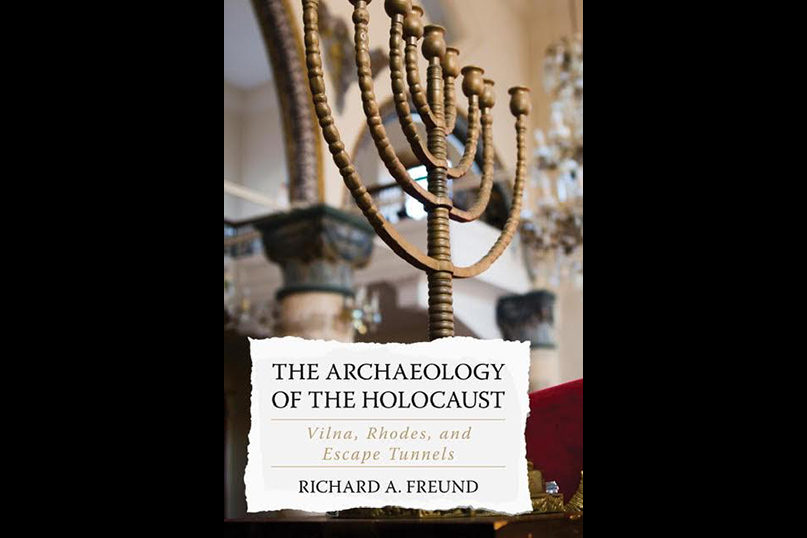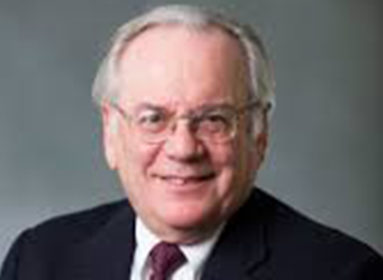
By Judie Jacobson
In his new book The Archaeology of the Holocaust: Vilna, Rhodes and Escape Tunnels, Dr. Richard Freund explains in detail how archaeological research is central to a deeper understanding of the Holocaust.
He should know. In his 20 years as director of the University of Hartford’s Maurice Greenberg Center of Judaic Studies, Freund has led a total of 30 different expeditions to Egypt, Jordan, Morocco, the UK, Argentina, Greece, Peru, Mexico, Spain, Israel, Poland, and Lithuania. He is also the author of six books on archaeology, two books on Jewish ethics, over 100 scholarly articles and he has appeared in 15 TV documentaries.
As part of the team that discovered a Holocaust escape tunnel at the extermination camp Sobibor, Freund pioneered the use of ground-penetrating radar to look for burial grounds.
This summer, Freund will leave the University of Hartford to become the inaugural holder of the Bertram and Gladys Aaron Endowed Professorship in Jewish Studies at Christopher Newport University in Newport News, Virginia.
Recently, he spoke with the Ledger about his new book.
Q: What has been the reaction to your new book?
A: There has been tremendous reaction to the idea which is central to the book: Science will be the next frontier for Holocaust studies.
My research group of geoscientists, geophysicists, archaeologists, restorers. numismatists, cartographers, GIS and chemical, biological and DNA specialists can go to the field and reconstruct a Holocaust site often without excavating. I call this “noninvasive archaeology” and it will allow us to document and mark many of the sites that Holocaust survivor testimonies have mentioned. It is the physical locations that will bring a new generation of students to the field to understand these are real places and they need to be preserved while we still have some survivors to help us.
My work included three sites in Poland, four sites in Greece, and 18 sites in Lithuania and is chronicled in three documentaries and in now scores of articles and reports. I feel like we are on the cusp of a new sub-discipline that can be used in genocide studies, history, archaeology, but primarily in the study of the Holocaust.
Q: How are you advancing the idea of using archaeology to further our understanding of the Holocaust?
A: On May 13, I spoke at the Explorer’s Club. It was a watershed event for the archaeology of the Holocaust. The Holocaust in general, and the Jews in Vilna and Rhodes in particular, had never been mentioned in any previous lectures. Since 1904, The Explorer’s Club has included some of the most famous archaeological excavations and expeditions lecturers in the world – astronauts, Nobel Prize winners, investigators. Now, the need to investigate the Holocaust with the same scientific vigor will insure that generations to come will see it as a significant area of research. I am preparing the largest group of investigators ever for this summer in Lithuania, Poland and Greece. Our project this summer includes multiple teams and faculty. Students and researchers will be investigating the lost Jewish cities and institutions of Rumsiskes, Seduva, Rhodes, and Alytus and, of course, our ongoing excavations at the Great Synagogue of Vilna.
Q: Who is the target audience for this book?
A: Everyone. Jews and non-Jews; people with or without science backgrounds; those with no background in the study of the Holocaust, those who do not know about geoscience and archaeology. I wrote it for Jews who know why Vilna was “The Jerusalem of Lithuania” and Rhodes was “La Chica Jerusalem” – and for non-Jews who have never heard of Ashkenazic and Sephardic Judaism. It is, in short, written for non-specialists and for millennials searching for a way to understand the Holocaust, and it is all about the students who go to the field with us and why this matters to them.
Q: What will you be working on next?
A: This summer I am taking my largest group of U.S. students and community people to Lithuania and Greece. We are excavating the Great Synagogue of Vilna, searching for a Lost Jewish Shtetl under a lake near Kaunas, and then I am taking my group to Rhodes to the 75th commemoration of the roundup of the Jews of Rhodes and Kos by the Nazis on one day: July 23, 1944. Extended families of Jews from Rhodes – those who left and those who were survivors of Auschwitz – will gather at the sites I have been working on. We will be preparing my work for 2020 in Rhodes and Kos.








 Southern New England Jewish Ledger
Southern New England Jewish Ledger










